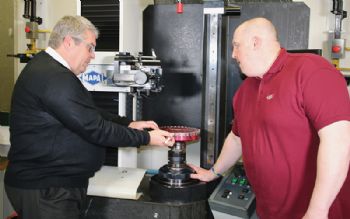
When Ford opened its Bridgend Engine Plant (BEP) in 1980, the CVH engine produced on the 1.52 million ft
2 site was one of Europe’s most popular power-train systems.
Over 30 years later, the engine used in the Escort, Fiesta, Sierra and Orion models of the 1980s and ’90s is long gone; the site is now producing the latest generation of environment-friendly Ford EcoBoost engines — plus V6 and V8 power units for Jaguar Land Rover.
Producing over 750,000 petrol engines a year, BEP is a key part of Ford’s European supply chain; and last year it announced proposals for the next generation of an all-new family of petrol engines to be manufactured in South Wales.
Ensuring that Ford hits its statistical process control (SPC) targets, along with ‘uncompromising levels of precision’ on the most critical elements within a vehicle, the company initiated a partnership with the cutting-tool company Mapal Ltd (
www.mapal.com).
The Rugby-based company, a leading supplier of poly-crystalline diamond (PCD) cutting tools, has supplied tooling to Ford Bridgend for over a decade and has a tooling engineer — Wayne Keepins — permanently based at the plant.
“We are committed to helping Ford hit targets of improving productivity or reducing costs by 10-15% year on year. This is a huge challenge that is commonplace in the global automotive sector.
“Mapal continually strives to exceed these expectations — something that can only be achieved by working in a true partnership.”
Mapal has an annual tooling supply to the plant well in excess of £1 million, with a large portion of its products applied to engine-block milling and hole-making applications. Like most modern-day engines, Ford’s power systems feature lightweight aluminium cylinder blocks with sintered-iron inserts pressed into bores.
That said, when it came to improving a specific machining problem relating to cylinder heads, Mapal met the challenge with bespoke multi-stepped drills.
Mr Keepins said: “To improve efficiency, productivity and tool-life and to reduce costs, we have to go beyond replacing previous hole-making tools and develop completely new concepts. One example is the machining of valve seats on the 1.5- and 1.6-litre engine line.
“The previous process used three different indexable-insert tools to undertake four processes that comprised machining the throat blend on intake ports, semi-finishing the intake-valve seat, piloting the valve guide and then finishing the valve seat and guide.
“We developed a new combination tool that would reduce the overall process from three tools to two, thereby reducing costs and set-up times and enhancing productivity.”
By removing the stock material in a single pass, Mapal eliminated the need for a separate throat-blend and valve-seat tool. The new combination tool reduced cycle times from 64 to 34sec, cut tool-setting times by 30% and reduced the number of tool changes by 800 per year.
Furthermore, Mapal has developed tools that address engine block machining issues. On the JLR V8 engine line, the crank-boring process was trapping swarf in the guide pads of the boring tool, while the rear of the tool was being contaminated with swarf particles.
To resolve the situation, Mapal developed a two-tool process to replace the previous three-tool operation. By eliminating the rough-boring tool and machining the complete bore from one side of the block, the new two-tool process reduced insert consumption and improved tool life by £52,000 per annum.
This was partly down to the new tool requiring only four inserts rather than eight. Moreover, the engine line, which manufactures 145,000 engines a year, also benefitted from enhanced bore precision and surface finishes, improved hourly engine throughput and reduced tool change-over times.
Concluding on the installation of hundreds of PCD and solid-carbide multi-function and combination tooling lines at BEP, Mr Keepins said: “To establish such a partnership with one of the world’s most recognised brands is credit to our dedication to the customer.
“We are on-site five days a week, looking to continuously develop and implement new innovations. Mapal has a manufacturing facility in Rugby that provides re-grinds, re-tips and returns used products to the Ford shopfloor in ‘as new’ condition.
“Moreover, new tools are manufactured in the UK and delivered directly to the Ford engine plant as and when required.”